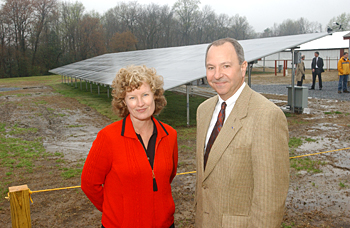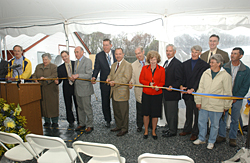
The project is a partnership between Allen Family Foods, WorldWater & Power Corp., GE Energy, the University of Delaware, the Delaware Department of Agriculture and the Delaware Department of Natural Resources and Environmental Control.
The cost of grid electricity in Delaware has significantly increased over the last 12 months, and this has adversely affected the poultry industry. Poultry houses are highly energy dependent; chickens must be kept at carefully controlled temperatures with appropriate ventilation. Energy costs are borne by the growers, who are independent operators contracted by poultry companies to raise day-old chicks to maturity.
Determining if solar power makes economic sense to the poultry industry will be rigorously evaluated during three years of study at the pilot, solar-powered poultry house. A research team comprised of University of Delaware faculty, students and professionals will monitor the house to assess the system's efficiency in collecting and using solar power. Weather data at the project site also will be monitored.
On sunny days, the solar radiation will be converted to electricity. This will be used to power the poultry house; any additional power that's required will be drawn from Delmarva Power's grid. At times when the photovoltaic system produces more power than the loads require, excess power will be directed to a back-up battery bank and to the grid via net metering. Delmarva Power has agreed to give credit for energy sent to its grid at the current market rate.
Charles C. “Chick” Allen III, chief executive officer of Allen Family Foods and a UD alumnus, offered the use of a company-owned farm in Laurel for the pilot study. “We work with 550 independent contractors on Delmarva who raise our chicks,” Allen said. “I was happy to have the opportunity to collaborate on a research project that has the potential to reduce costs for these growers. I want to do anything I can to maintain the economic viability of the Delmarva poultry industry.”
As America turns to ethanol as a fuel source, Allen suggested the nation “not forget the value of the sun, and the truly free energy it produces. The sun is a renewable energy source; we just need to learn how to use it.”
Noting the rainy day, Allen reminded those in attendance that “the sun is out - it is just obscured by clouds.”
The project combines two of the University's strengths, UD President David P. Roselle said. “The University has long been a leader in solar cell technology and is well known for its poultry research programs,” he said. “It was a no-brainer to put the two together.”
The collaboration of government, academia and industry in such projects is “at the heart of the Land Grant mission,” Roselle said.
Gov. Ruth Ann Minner added that the state has become known for such collaborative efforts, and called them “the Delaware way.”
“It is vital that we continue to explore ways to take advantage of alternative energy sources,” Minner said.
U.S. Senator Thomas R. Carper (D-Del.) said that rising carbon dioxide emissions, high demand for electricity and environmental concerns make it imperative that the nation seeks alternatives. “How smart is it to capture the energy of the sun?” he asked. “This project can helps growers keep chickens alive, help prevent brownouts and provide needed electricity.”
Carper added that while a student at UD he once designed a solar panel but never envisioned it could be used to power a chicken house.
Robin W. Morgan, dean of UD's College of Agriculture and Natural Resources, said that the project began as a modeling effort by the UD Center for Energy and Environmental Policy, and then took off at a meeting of the Delaware Science and Technology Council, when the topic of rising electricity costs was discussed. The council, which is chaired by Delaware Lt. Gov. John Carney, is a group of state officials and business and academic leaders who work to advance technology in Delaware.
The pilot photovoltaic system, which is designed to evaluate a variety of use options and generate extensive research data, cost approximately $500,000, but the project is eligible for a rebate of $250,000 from the Delaware Green Energy Program. Solar-powered systems also are eligible for state and federal tax credits.

“Success in this initiative will have a number of important benefits,” David S. Weir, director of the Delaware Biotechnology Institute, said. “First, it will improve the profitability and sustainability of the poultry industry in Delaware, thereby strengthening the state's economy. It will help retain jobs in the poultry industry and create new jobs in solar cell production. And it will demonstrate a process whereby the public, private and academic sectors can get together to solve real problems.
“There is one caveat,” Weir said. “For Delaware to be a leader in alternative energy technologies, the enactment of appropriate legislation will be required.”
“This project is important to help our poultry industry stay competitive and our producers remain profitable, as well as cut our dependence on foreign oil,” Delaware Secretary of Agriculture Michael Scuse said.
“Solar power provides a clean, safe and sustainable energy source that has the potential to eliminate standby generators and their subsequent pollution,” John A. Hughes, secretary of the Delaware Department of Natural Resources and Environmental Control, said.
“Delaware's poultry industry is very energy intensive. From this research, we will gain valuable information on the benefits of solar technology for the agriculture industry and for us all,” he added.
Following the morning ribbon cutting, an open house was held and more than 100 people attended.
About the project participants
UD's College of Agriculture and Natural Resources offers more than 20 academic programs related to science, business, economics and engineering technology. The college is known for its integrated poultry research programs, which range from molecular to organismal and applied studies.
UD's Center for Energy & Environmental Policy is a leading institution for interdisciplinary graduate education, research and advocacy in energy and environmental policy.
The Delaware Science & Technology Council is made up of academic, public and business representatives charged with providing strategic advice and guidance on science and technology matters important to the prosperity of Delaware.
Allen Family Foods Inc. is an industry leader and a global exporter of premium poultry products. Based in Seaford, Allen Family Foods processes more than 2.5 million birds per week and packs about 12 million pounds of finished products per week. The company employs more than 3,000 people at locations in Delaware, Maryland and North Carolina.
WorldWater & Power Corp. is a leader in solar electric engineering, water management solutions, solar energy installations and products. The company is responsible for major breakthroughs in solar power technology and holds numerous solar-related patents.
GE Energy is one of the world's leading suppliers of power generation and energy delivery technologies. GE Energy works in all areas of the energy industry, including renewable resources such as water, wind, solar and biogas. It is an industry leader in the integrated design of solar electric systems.
Photos by Duane Perry


